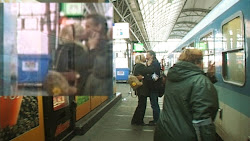July 2010, I completed this film.
I'd shot the footage in 2001 on a journey home from Amsterdam to Berlin. After attending an experimental music symposium with a league of musicians from NZ led by Jack Body, I was filming with some leftover tapes and planning on capturing environmental sounds of trains and stations as the train journey is such a loud part of a NZ emigré's journey in Central Europe. I let my ears and the camera lead...
I found the nervous drug deal through the camera lens and as I was on full zoom, I nearly dropped the machine when this girl ran at me yelling 'Fucking tourist ... Turn your fucking camera off'. I obliged, not sure whether she would have time to get on board my train before we pulled away from the station... she didn't and I later kicked myself for being such a pansy. But there you go it's pretty much between the documenter and the subject what to do when someone asks you not to film.
So it was that when our train hit someone on the track a short time later and undoubtedly killed them although it was never spelled out... I was full of thoughts of the voyeuristic film-maker. Certain that I had no right to film anything at all, at the time and uncertain that I had a reason to, I discussed it a little with my fellow-passengers and found them quite at ease with the idea. However, under the circumstances I couldn't bring myself to film them very strongly or to question them, so what emerged was a scarcity of footage of people at all, no intentional storyline, and a rather quivery kind of gaze toward the unexpected occurrence of death.
Yet for the others who were with me and local to that area of established rail development, it wasn't perhaps so unexpected. Also I felt later that I had the legal right to film as might a news journalist; that there was plenty of reason in hindsight, to edit what I had into a film that communicates the experience, to someone.. ..
For myself, I found a new poetry in the editing process. I suppose that came from the poetic state in which I started filming the journey. But the editing was not the usual. It took a long time before I found translations for some parts of the dialogue, (It turns out the speaker was combining languages ? Some detective work was required. Eventually I worked out that the conversation was about why the previous train had been delayed. This added to the shape of the film.
The soundtrack was made in a live performance with the original footage screening silently in the background. (Poetry Live at the Classic). Chris O'Conner was the percussionist and I'd worked with him on various occasions using improvised word and sound poetry in performance. My intent has been and was that in an improvisational mode, poetic phrasing might come from a reservoir if you like a ' psychological reservoir ' of poetic discourse on the theme. It seemed appropriate that this would reflect the pattern of unexpected occurrence and leave me with similarly random material to edit into the sound for the film.
Some people have observed that it is unfinished, and clearly needs more editing before we can see it. I like it as it is. This is a post-structural poetry-film, and there is actually a lot in it to be observed although it doesn't use a typical structure. Instead it works symbolically in three main parts like a triptych. The first is more traditional and sets up as a film. The central part is a journey beyond a train journey. I would like it to invite the watcher to 'lean their head' as they would on a train. I think it really does require participation & contemplation. The third part is different again. The idea is that those who have followed the film will receive the latter part in a different state. It's not punchy, it's very open to interpretation, and I understand too that it really will appeal to some and not to others in the same way.
Aren't we are growing through the shadows now of the first World War's wasteful expenditures? and our maturing as an international society can feel threatened by those parts of the world suffering from arrested development in this sense.
I am still, perhaps always.. a scholar, of the personification of death in art or literature, but in this offering I hope there's a sense of something very lively. That in the fruit of consideration there are all the ghosts of the world transformed from ghastliness to song.




No comments:
Post a Comment